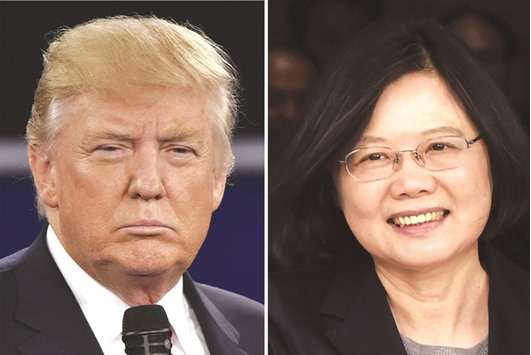Chinese state media said yesterday that US President-elect Donald Trump’s “inexperience” led him to accept a phone call from Taiwan’s leader but warned that any breach of the One China policy would “destroy” Sino-US relations.
The call “exposed nothing but (Trump’s) and his transition team’s inexperience in dealing with foreign affairs”, said an editorial in the English-language China Daily newspaper, adding there was “no need to over-interpret” it.
But it hinted at the possible economic impact of any breakdown in ties, saying that China held $1.19tn in US treasury bonds and had bilateral trade worth $558bn with the country last year.
“If Trump wants to overstep the One China principle, he will destroy Sino-US ties,” it said.
Trump’s call with Tsai Ing-wen Friday broke with decades of US foreign policy precedent, raising questions on whether it marked a deliberate pivot away from Washington’s official “One China” stance.
Washington cut formal diplomatic relations with the island in 1979 and recognises Beijing as the sole government of “One China” — while keeping friendly, non-official ties with Taipei.
China regards self-ruling Taiwan as part of its own territory awaiting reunification under Beijing’s rule, and any US move that would imply support for independence would likely trigger fury.
Trump congratulated Tsai on her election as president this year and discussed the “close economic, political and security ties” of the US and Taiwan, according to the president-elect’s office. Beijing said it made solemn representations to the US after the call, which was initiated by Taiwan.
But its response has largely been muted, with most criticism in state media directed at Tsai, who has enraged mainland authorities by taking a more independent stance than her Beijing-friendly predecessor.
The often nationalistic Global Times newspaper in an editorial Saturday threatened that Tsai would “pay the price” if Taiwan “crosses the red line”, and said China would “use its power without hesitation” to punish any move toward independence.
It attributed the call to her administration’s “tricks”, noting that Trump “is not familiar with foreign relations”.
Trump’s advisers have signalled a friendlier stance toward the island of 23mn, which enjoys a democratic government and vibrant press unlike the communist-ruled mainland.
In a November article for Foreign Policy magazine, Trump advisers Peter Navarro and Alexander Gray wrote that the Obama administration’s treatment of Taiwan had been “egregious” and called for more support of “this beacon of democracy in Asia (that) is perhaps the most militarily vulnerable US partner anywhere in the world”.
After the Trump-Tsai call, the outgoing Obama administration said it had not changed its stance.
“There is no change to our longstanding policy on cross-Strait issues,” National Security Council spokeswoman Emily Horne told reporters.
“We remain firmly committed to our ‘One China’ policy,” she added. “Our fundamental interest is in peaceful and stable cross-Strait relations.”
President-elect Donald Trump’s controversial telephone conversation with the leader of Taiwan was just a “courtesy call,” US vice president-elect Mike Pence said yesterday.
“It was nothing more than taking a courtesy call from a democratically elected leader,” Pence told ABC’s This Week programme, speaking about the Friday call between Trump and Taiwan’s Tsai Ing-wen, which broke decades of US diplomatic policy and risks creating a serious rift with China.
Washington cut formal diplomatic relations with the island in 1979 and recognises Beijing as the sole government of “One China” – while keeping friendly, non-official ties with Taipei.
China regards self-ruling Taiwan as part of its own territory awaiting reunification, and any US move implying support for independence – even calling Tsai “president,” as Trump did in a tweet announcing the call – prompts grave offense in China.
Trump “took the call, accepted her congratulations and good wishes and it was precisely that,” Pence said.
Pence was asked directly if there were any implications for the “One China” policy.
“We’ll deal with policy after January the 20th,” he said, referring to the day that Trump takes office.
Speaking on “Fox News Sunday,” Trump aide Kellyanne Conway said that her boss “is well aware” of Washington’s “One-China” policy.
“It was just a phone call at this point. It signals the fact that he accepted a congratulatory call,” Conway said.
“I know China has a perspective on it. The White House and state department probably have a perspective on it. Certainly Taiwan has a perspective on it. The president-elect’s perspective is he accepted a congratulatory call.
“When he’s sworn in as commander-in-chief, he’ll make clear the fullness of his plans. But people shouldn’t read too much into it,” she said.
Since his surprise November 8 victory Trump has accepted congratulatory calls from numerous leaders, including the prime ministers or presidents of Israel, Singapore, Japan and China, Conway said.
Trump “is not out there making policy or announcing new policy prescriptions worldwide. He’s merely taking phone calls,” Conway said.
“We know about ‘One China.’ He knows about ‘One China.’ He’s routinely briefed on these matters. That just is what it is,” she added.

Donald Trump and Taiwan’s President Tsai Ing-wen.
